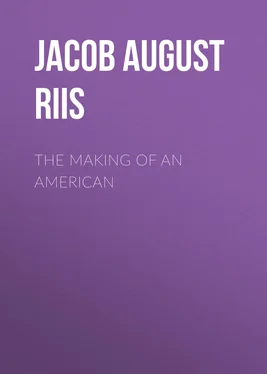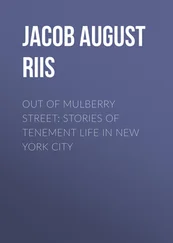Jacob August Riis - The Making of an American
Здесь есть возможность читать онлайн «Jacob August Riis - The Making of an American» — ознакомительный отрывок электронной книги совершенно бесплатно, а после прочтения отрывка купить полную версию. В некоторых случаях можно слушать аудио, скачать через торрент в формате fb2 и присутствует краткое содержание. Жанр: Биографии и Мемуары, История, foreign_edu, foreign_antique, foreign_prose, на английском языке. Описание произведения, (предисловие) а так же отзывы посетителей доступны на портале библиотеки ЛибКат.
- Название:The Making of an American
- Автор:
- Жанр:
- Год:неизвестен
- ISBN:нет данных
- Рейтинг книги:5 / 5. Голосов: 1
-
Избранное:Добавить в избранное
- Отзывы:
-
Ваша оценка:
- 100
- 1
- 2
- 3
- 4
- 5
The Making of an American: краткое содержание, описание и аннотация
Предлагаем к чтению аннотацию, описание, краткое содержание или предисловие (зависит от того, что написал сам автор книги «The Making of an American»). Если вы не нашли необходимую информацию о книге — напишите в комментариях, мы постараемся отыскать её.
The Making of an American — читать онлайн ознакомительный отрывок
Ниже представлен текст книги, разбитый по страницам. Система сохранения места последней прочитанной страницы, позволяет с удобством читать онлайн бесплатно книгу «The Making of an American», без необходимости каждый раз заново искать на чём Вы остановились. Поставьте закладку, и сможете в любой момент перейти на страницу, на которой закончили чтение.
Интервал:
Закладка:
I had letters to the Danish Consul and to the President of the American Banknote Company, Mr. Goodall. I think perhaps he was not then the president, but became so afterward. Mr. Goodall had once been wrecked on the Danish coast and rescued by the captain of the lifesaving crew, a friend of my family. But they were both in Europe, and in just four days I realized that there was no special public clamor for my services in New York, and decided to go West. A missionary in Castle Garden was getting up a gang of men for the Brady's Bend Iron Works on the Allegheny River, and I went along. We started a full score, with tickets paid, but only two of us reached the Bend. The rest calmly deserted in Pittsburg and went their own way. Now here was an instance of what I have just been saying. Not one of them, probably, would have thought of doing it on the other side. They would have carried out their contract as a matter of course. Here they broke it as a matter of course, the minute it didn't suit them to go on. Two of them had been on our steamer, and the thought of them makes me laugh even now. One was a Dane who carried an immense knapsack that was filled with sausages, cheese, and grub of all kinds when he came aboard. He never let go of it for a moment on the voyage. In storm and sunshine he was there, shouldering his knapsack. I think he slept with it. When I last saw him hobbling down a side street in Pittsburg, he carried it still, but one end of it hung limp and hungry, and the other was as lean as a bad year. The other voyager was a jovial Swede whose sole baggage consisted of an old musket, a blackthorn stick, and a barometer glass, tied up together. The glass, he explained, was worth keeping; it might some day make an elegant ruler. The fellow was a blacksmith, and I mistrust that he could not write.
Adler and I went on to Brady's Bend. Adler was a big, explosive German who had been a reserve officer, I think, in the Prussian army. Fate had linked us together when on the steamer the meat served in the steerage became so bad as to offend not only our palates, but our sense of smell. We got up a demonstration, marching to see the captain in a body, Adler and I carrying a tray of the objectionable meat between us. As the spokesman, I presented the case briefly and respectfully, and all would have gone well had not the hot blood of Adler risen at the wrong moment, when the captain was cautiously exploring the scent of the rejected food. With a sudden upward jerk he caused that official's nose to disappear momentarily in the dish, while he exploded in voluble German. The result was an instant rupture of diplomatic relations. Adler was put in the lock-up, but set fiee again immediately. He spent the rest of the voyage in his bunk shouting dire threats of disaster impending from the "Norddeutsche Consul," once he reached New York. But we were all too glad to get ashore to think of vengeance then.
Adler found work at the blast-furnace, while I was set to building huts for the miners on the east bank of the river where a clearing had been made and called East Brady. On the other side of the Allegheny the furnaces and rolling mills were hidden away in a narrow, winding valley that set back into the forest-clad hills, growing deeper and narrower with every mile. It was to me, who had been used to seeing the sun rise and set over a level plain where the winds of heaven blew as they listed, from the first like a prison. I climbed the hills only to find that there were bigger hills beyond—an endless sea of swelling billows of green without a clearing in it. I spent all Sunday roaming through it, miles and miles, to find an outlook from which I might see the end; but there was none. A horrible fit of homesickness came upon me. The days I managed to get through by working hard and making observations on the American language. In this I had a volunteer assistant in Julia, the pretty, barefooted daughter of a coal-miner, who hung around and took an interest in what was going on. But she disappeared after I had asked her to explain what setting one's cap for any one meant. I was curious because I had heard her mother say to a neighbor that Julia was doing that to me. But the evenings were very lonesome. The girl in our boarding-house washed dishes always to one tune, "The Letter that Never Came." It was not a cheerful tune and not a cheerful subject, for I had had no news from home since I left. I can hear her yet, shrieking and clattering her dishes, with the frogs yelling accompaniment in the creek that mumbled in the valley. I never could abide American frogs since. There is rest in the ko-ax, ko-ax! of its European brother, but the breathless yi! yi! of our American frogs makes me feel always as if I wanted to die—which I don't.
In making the clearing, I first saw an American wood-cutter swing an axe, and the sight filled me with admiration for the man and the axe both. It was a "double-bitter," and he a typical long-armed and long-limbed backwoodsman. I also had learned to use the axe, but anything like the way he swung it, first over one, then over the other shoulder, making it tell in long, clean cuts at every blow, I had never dreamt of. It was splendid. I wished myself back in Copenhagen just long enough to tell the numskulls there, who were distrustful of American tools, which were just beginning to come into the market, that they didn't know what they were talking about. Of course it was reasonable that the good tools should come from the country where they had good use for them.
There was a settlement of honest Welshmen in the back hills, and the rumor that a Dane had come into the valley reached it in due course. It brought down a company of four sturdy miners, who trudged five miles over bad land of a Sunday to see what I was like. The Danes who live in Welsh song and story must have been grievous giants, for they were greatly disgusted at sight of me, and spoke their minds about it without reserve, even with some severity, as if I were guilty of some sort of an imposition on the valley.
It could hardly have been this introduction that tempted me to try coal-mining. I have forgotten how it came about—probably through some temporary slackness in the building trade; but I did try, and one day was enough for me. The company mined its own coal. Such as it was, it cropped out of the hills right and left in narrow veins, sometimes too shallow to work, seldom affording more space to the digger than barely enough to permit him to stand upright. You did not go down through a shaft, but straight in through the side of a hill to the bowels of the mountain, following a track on which a little donkey drew the coal to the mouth of the mine and sent it down the incline to run up and down a hill a mile or more by its own gravity before it reached the place of unloading. Through one of these we marched in, Adler and I, one summer morning with new pickaxes on our shoulders and nasty little oil lamps fixed in our hats to light us through the darkness where every second we stumbled over chunks of slate rock, or into pools of water that oozed through from above. An old miner whose way lay past the fork in the tunnel where our lead began showed us how to use our picks and the timbers to brace the slate that roofed over the vein, and left us to ourselves in a chamber perhaps ten feet wide and the height of a man.
We were to be paid by the ton, I forget how much, but it was very little, and we lost no time getting to work. We had to dig away the coal at the floor with our picks, lying on our knees to do it, and afterward drive wedges under the roof to loosen the mass. It was hard work, and, entirely inexperienced as we were, we made but little headway. As the day wore on, the darkness and silence grew very oppressive, and made us start nervously at the least thing. The sudden arrival of our donkey with its cart gave me a dreadful fright. The friendly beast greeted us with a joyous bray and rubbed its shaggy sides against us in the most companionable way. In the flickering light of my lamp I caught sight of its long ears waving over me—I don't believe I had seen three donkeys before in my life; there were none where I came from—and heard that demoniac shriek, and I verily believe I thought the evil one had come for me in person. I know that I nearly fainted.
Читать дальшеИнтервал:
Закладка:
Похожие книги на «The Making of an American»
Представляем Вашему вниманию похожие книги на «The Making of an American» списком для выбора. Мы отобрали схожую по названию и смыслу литературу в надежде предоставить читателям больше вариантов отыскать новые, интересные, ещё непрочитанные произведения.
Обсуждение, отзывы о книге «The Making of an American» и просто собственные мнения читателей. Оставьте ваши комментарии, напишите, что Вы думаете о произведении, его смысле или главных героях. Укажите что конкретно понравилось, а что нет, и почему Вы так считаете.












